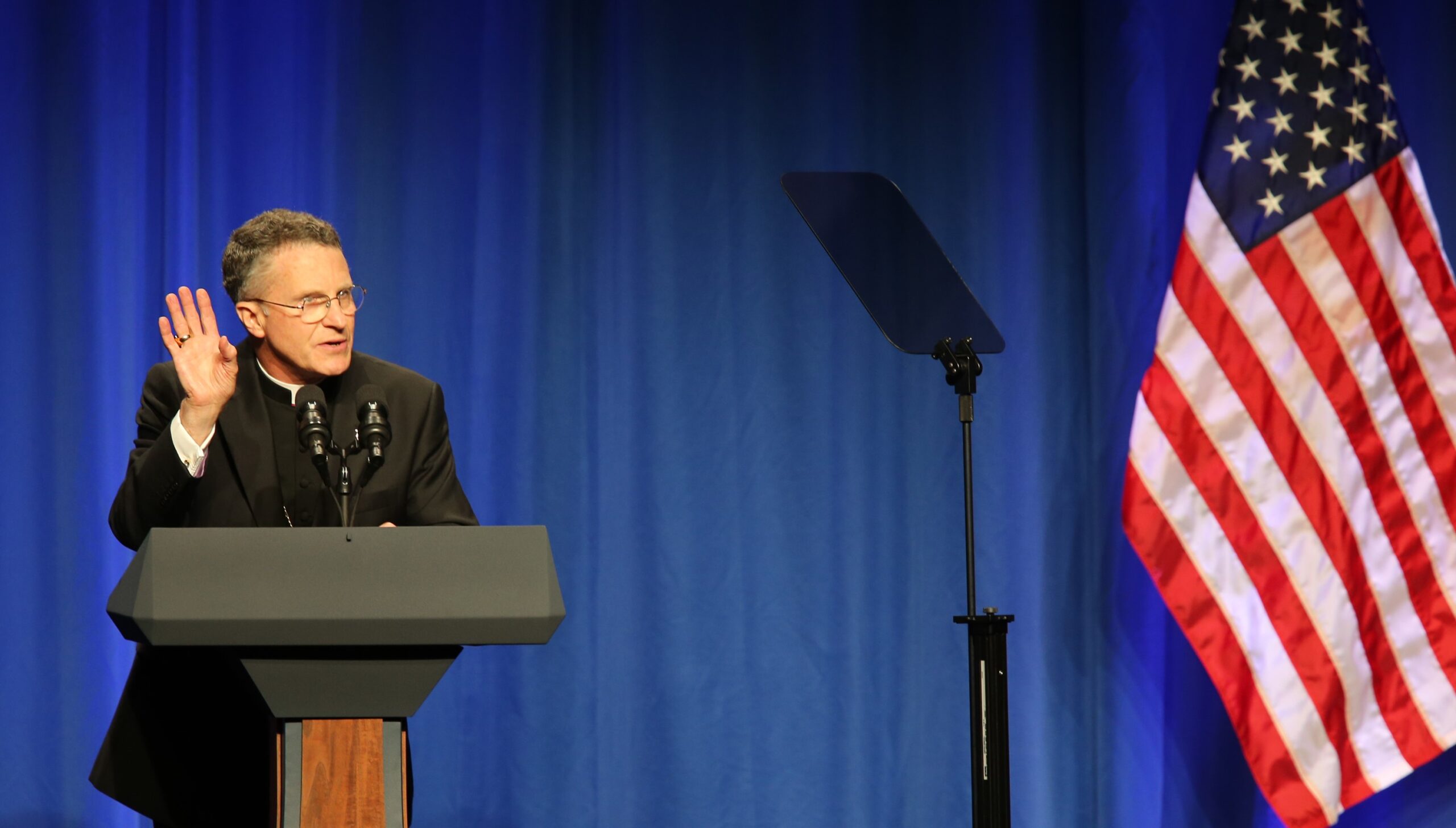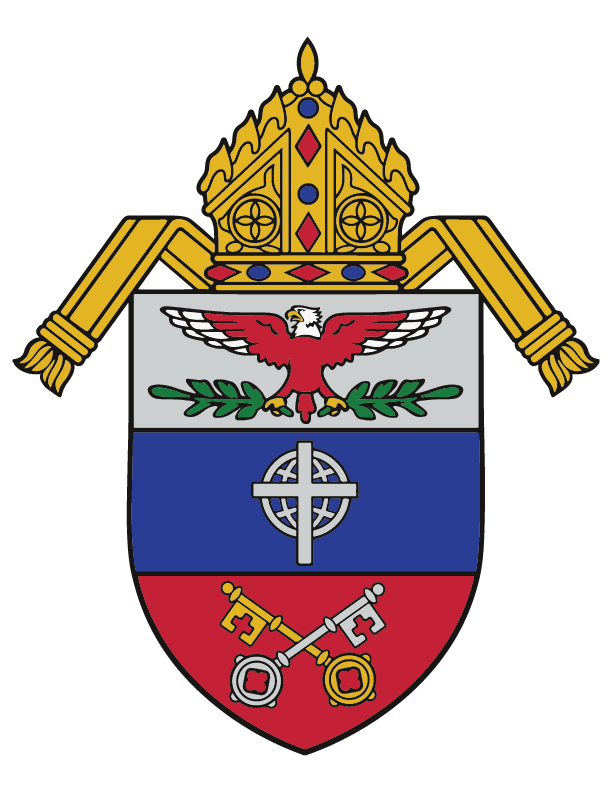
WASHINGTON, D.C. – With the Fourth of July holiday coming up in just three weeks, the nation will once again celebrate its birth and contemplate what it means to be an American. In his keynote speech to the National Catholic Prayer Breakfast last week, His Excellency, the Most Reverend Timothy P. Broglio, J.C.D., Archbishop for the Military Services, noted that ours is a nation founded on truths, virtues, and principles. The Archbishop observed: “The US was not established, because of a common ethnic or racial origin, or a common language,or those other elements that characterize many other nations of the world. It is based on certain self-evident truths: life, liberty, and the pursuit of happiness.”
Remembering those who paid the ultimate sacrifice in defense of liberty, Archbishop Broglio reflected on some of the virtues required of both good Catholics and good citizens. Here follows the text of Archbishop Broglio’s speech:
Authentic Virtues build up a Nation
Dear Brothers and Sisters in Christ,
Thank you for this opportunity to speak to all of you. The prayer breakfast enjoys a long tradition in the Armed Forces of this Nation and it has been my privilege to speak at many of them over the last nine years. They always represent a moment of shared ecumenical and interfaith prayer.
The Armed Forces have many heroes and I would like to call to mind Father Verbis Lafleur, a priest of Lafayette, Louisiana who was a chaplain to the Army Air Corps in the Second World War.
When the Philippines were about to fall, he had the opportunity to fly out to safety, but elected to remain with his men. He became their vibrant leader during the harsh captivity. Like so many chaplains he knew how to lead and at the same time how to frustrate the captors’ designs.
The enemy wanted the prisoners of war to rebuild an airfield—clearly contrary to the Geneva Convention. Father managed to make it appear that they were collaborating in the project, but always one step forward and two backwards. He constantly inspired hope in his men.
Finally as the islands were about to be recaptured, the prisoners of war were put in the hold of a prison ship. Unfortunately, the Allied Forces torpedoed that ship without realizing that it houses US prisoners of war. Father Lafleur died as he pushed his fellow captives up the ladder out of the hold of the ship. He was a man for others right to the end.
Dear Friends, that response to a crisis situation does not happen in a vacuum. The Military trains men and women to react to different situations. In war time they are taught what to do when captured. However, the response in those concrete situations depends on the individual, the raw material, as it were.
If we were to survey the history of the Church and looked at the lives of the saints, we would discover men and women who built on their virtues to reflect the authenticity of their faith. The same faith has an impact on the Nation.
To quote a respected Cardinal: a good Catholic is a good American, because the practice of virtue also leads to good citizenship and there is no dichotomy between faith and life if we cultivate and practice virtue. (James Cardinal Harvey made the point at the US Embassy to the Holy See at the time of his consistory.) Each of us has the potential to rebuild our society and our world if we cultivate authentic virtue.
Virtue comes from vir meaning man, manliness, worth.
The old Webster’s Dictionary offers as its first definition: “General moral goodness; right action and thinking; uprightness; rectitude; morality.” (Webster’s New Twentieth Century Dictionary of the English Language, II, p. 2042.)
What are some of these virtues? Five come to mind at once: the Cardinal virtues of prudence, justice, fortitude, and temperance to which I would add selflessness. Perhaps in our prayer today, we might beg for an increase in those virtues.
“St. Thomas Aquinas ranked prudence as the first cardinal virtue, because it is concerned with the intellect. Aristotle defined prudence “right reason applied to practice.” It is the virtue that allows us to judge correctly what is right and what is wrong in any given situation. Because it is so easy to fall into error, prudence requires us to seek the counsel of others, particularly those we know to be sound judges of morality. Disregarding the advice or warnings of others whose judgment does not coincide with ours is a sign of imprudence.” (Excerpted from About Catholicism.)
It calls us to look beyond the immediate, to avoid quick judgment about persons or things when there is time to evaluate. Perhaps, given the fast pace of contemporary times, it is a virtue whose importance cannot be exaggerated. Some decisions or conclusions require an earnest use of time. They defy snap judgments and foregone conclusions.
It might be a good virtue to propose to the news media or to those well-versed in the immense quantities of data available to us, but who have little or no criteria on which to evaluate that data. Never before has so much been offered with so little guidance as to what is true and what is false.
“Justice is concerned with the will. It is “the constant and permanent determination to give everyone his or her rightful due.” (Cf. John A. Hardon, Modern Catholic Dictionary.) We say that “justice is blind,” because it should not matter what we think of a particular person. If we owe him a debt, we must repay exactly what we owe.
Justice is connected to the idea of rights, but legal rights can never outweigh natural ones.” (Ibid.)
The third cardinal virtue is fortitude. While this virtue is commonly called courage, it is different from what much of what we think of as courage today. Fortitude allows us to overcome fear and to remain steady in our will in the face of obstacles, but it is always reasoned and reasonable; the person exercising fortitude does not seek danger for danger’s sake. Prudence and justice are the virtues through which we decide what needs to be done; fortitude gives us the strength to do it.
“Fortitude ensures firmness in difficulties and constancy in the pursuit of the good.” (CCC 1837.)
“Temperance moderates the attraction of the pleasures of the senses and provides balance in the use of created goods.” (CCC 1838.) “While fortitude is concerned with the restraint of fear so that we can act, temperance is the restraint of our desires or passions.”
“Temperance is the virtue that attempts to keep us from excess, and, as such, requires the balancing of legitimate goods against our inordinate desire for them. Our legitimate use of such goods may be different at different times; temperance is the “golden mean” that helps us determine how far we can act on our desires.” (Excerpted from About Catholicism.)
What I have called selflessness is certainly one of the motivating factors that leads a young person to volunteer for military service. It is a desire to latch on to an ideal and to serve a purpose greater than oneself and his or her interests. The appeal of a greater good has motivated generations of individuals to give their lives for military service, statesmanship, teaching the under privileged, and service to the poor.
It is the antidote to the rather materialistic world in which we live where the primary goals are me, my self-fulfillment, what I want, what this or that thing will do for me. It is a virtue that is so important on the path to greatness.
It is living the example of Jesus Christ who gave up His life so as to give life for the multitude. Generations have followed this example. I mentioned Father Lafleur, but I could also cite many other examples.
Sentiments of self-giving have always accompanied our land. The US was not established, because of a common ethnic or racial origin, or a common language, or those other elements that characterize many other nations of the world. It is based on certain self-evident truths: life, liberty, and the pursuit of happiness.
Our virtue will give us strength and wisdom if we are open to it. Virtue, especially as right judgment, will also guide our path in the midst of the rule of law.
“Laws are not necessarily the embodiment of the moral good. Indeed it is possible that some laws undermine rather than enrich the human family. Members of a pluralistic society must, therefore, face the challenging fact that what is clearly legal is not automatically clearly moral. If we need evidence of this, we need only think of laws that have supported slavery, the subordination of women, disenfranchising of native Americans, [the suppression of innocent life in the womb or in situations of terminal illness, and various forms of ethnic, racial, and religious prejudice. Even when such policies were legal, they were still immoral. (Most Reverend James A. Hickey, Red Mass, 1980.)
“Deep within his conscience man discovers a law which he has not laid upon himself but which he must obey. Its voice, ever calling him to love and to do what is good and to avoid evil, sounds in his heart at the right moment…. For man has in his heart a law inscribed by God…. His conscience is man’s most secret core and his sanctuary. There he is alone with God whose voice echoes in his depths.” (Cf. GS 16 as cited in CCC 1776.)
Dear Friends, Father Lafleur responded to his POW situation with creative courage. He drew on his virtue to care for, protect, and fortify the men imprisoned with him. Many survived because he was a man of virtue who gave unstintingly of himself. To speak of the greatness of our Country is to speak of men and women of virtue who gave of themselves for the benefit of all. We build for a new tomorrow when we draw from that wellspring of virtue.
Thank you and may God bless you!
